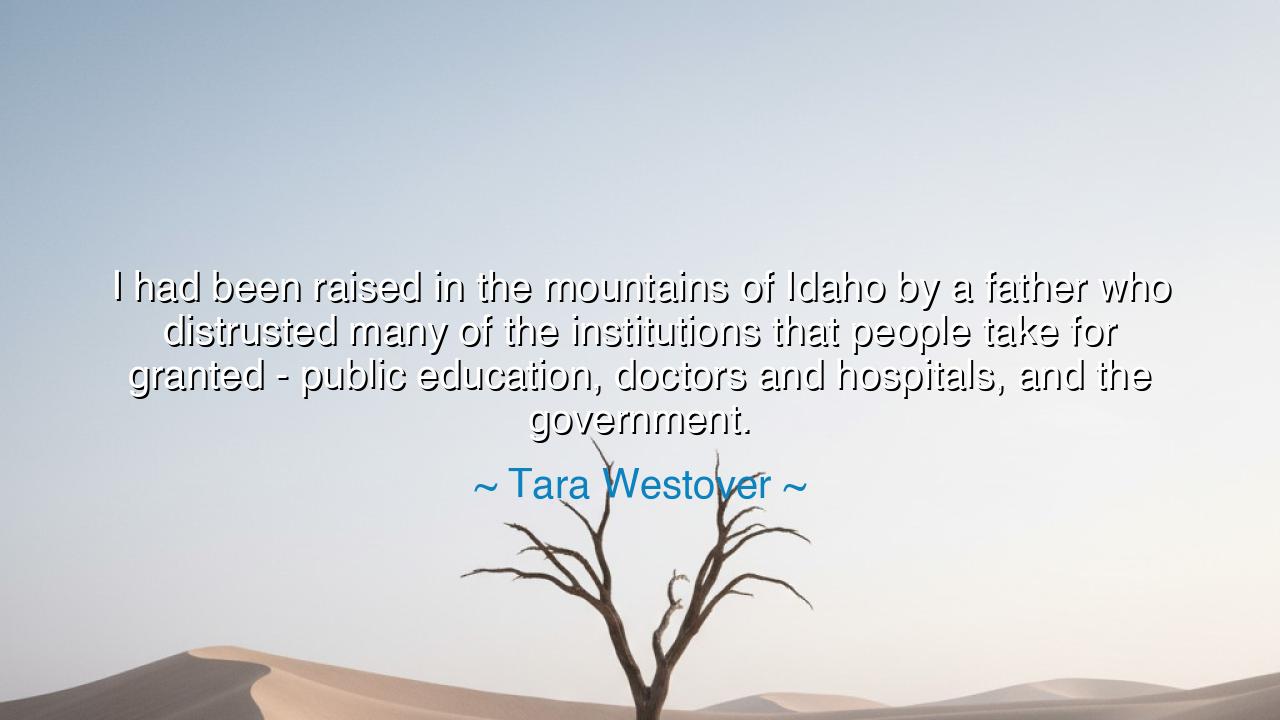
I had been raised in the mountains of Idaho by a father who
I had been raised in the mountains of Idaho by a father who distrusted many of the institutions that people take for granted - public education, doctors and hospitals, and the government.






In the stillness of the American mountains, where the snow lies deep and the sky stretches endless and blue, a young woman named Tara Westover grew up in a world apart from the modern age. Her words, simple yet profound, carry the weight of that solitude:
"I had been raised in the mountains of Idaho by a father who distrusted many of the institutions that people take for granted — public education, doctors and hospitals, and the government."
These words are not merely the reflection of a childhood; they are the confession of a soul who awakened to the power of knowledge after living in its absence. They speak to the eternal struggle between isolation and understanding, between the safety of what is known and the perilous beauty of what lies beyond. Tara’s life, chronicled in her memoir Educated, is the story of a spirit that fought to rise above the walls built by fear, by distrust, and by the ancient illusion that self-reliance must mean separation from the world.
The meaning of her words lies in the revelation that ignorance can masquerade as purity, and fear can disguise itself as protection. Her father, though driven by love and conviction, was ruled by distrust — a distrust of the institutions that bind human life together: schools that teach, doctors who heal, governments that organize and protect. In rejecting these, he sought purity and independence, but in doing so, he closed the door to growth. For the institutions of mankind, though flawed, are not chains; they are bridges — born from our shared desire to survive, to learn, to heal. To shun them entirely is to deny both the wisdom of others and the humility of our own limits.
And yet, there is also truth in his mistrust. The great irony of Westover’s story is that her father’s rejection of society springs from a kernel of truth twisted into extremity. History is not innocent — there have been times when governments have lied, when education has been used as a tool of control, when medicine has failed or corrupted its purpose. The wise of every age have known that institutions, though necessary, must always be watched with vigilance. But where wisdom asks for discernment, fear demands rejection. Tara’s father chose the latter path — cutting his family off from the world, believing he was preserving purity, when in truth, he was imprisoning his children within the confines of his fear.
From that prison, Tara Westover broke free. Without the schooling that most take for granted, she taught herself to read deeply, to study fiercely, to climb from her mountain into the halls of learning — first to Brigham Young University, then to Cambridge and Harvard. Hers was not merely a journey of intellect, but a pilgrimage of identity. Each book she opened was a battle against the invisible walls of her upbringing. Every truth she learned was a light cast against the shadow of inherited belief. And yet, as she grew, she came to see her father not as a villain, but as a symbol of a larger human condition — the condition of those who fear the world’s imperfection so deeply that they would rather withdraw than engage.
Her story mirrors countless others throughout history. Consider Galileo Galilei, who stood against the Church’s distrust of science, proclaiming that the Earth moved though the heavens forbade it. Like Tara, he sought knowledge not to destroy faith, but to expand it. Yet those who ruled in fear silenced him, just as Tara’s father sought to silence the questions that threatened his faith. In both tales, we see that ignorance is not always born of malice; often, it is born of love — a misguided love that confuses control with protection, certainty with truth.
The origin of Tara’s quote, then, lies not only in her mountain home, but in the universal story of mankind — the tension between the individual and the world, between self-reliance and community. Every generation must wrestle with this question: how much should we trust the systems we have built, and how much must we guard ourselves against them? The answer, as her life shows, lies not in rejection nor in blind acceptance, but in education — the kind that opens both the mind and the heart. Education, in its truest form, is not submission to institutions, but the reclaiming of one’s own power to think, to question, to choose.
Thus, the lesson of Tara Westover’s words is twofold. First, do not despise the structures that humanity has built to sustain itself — for though they may fail, they are born from the best of our collective striving. Second, do not surrender your soul entirely to them — for institutions can grow cold when unexamined. The balance lies in wisdom: to walk among men yet remain free in thought, to seek guidance without surrendering one’s conscience, to learn even from those one mistrusts.
So take this teaching to heart, O listener of the ages: education is the bridge between solitude and society, between fear and freedom. Question what you are told, but do not withdraw from the world. Seek truth in the light of reason, but temper it with compassion. And remember the example of Tara Westover — that the climb from ignorance to understanding is not easy, but it is sacred.
Thus ends the teaching: isolation preserves the body, but education frees the soul.






AAdministratorAdministrator
Welcome, honored guests. Please leave a comment, we will respond soon